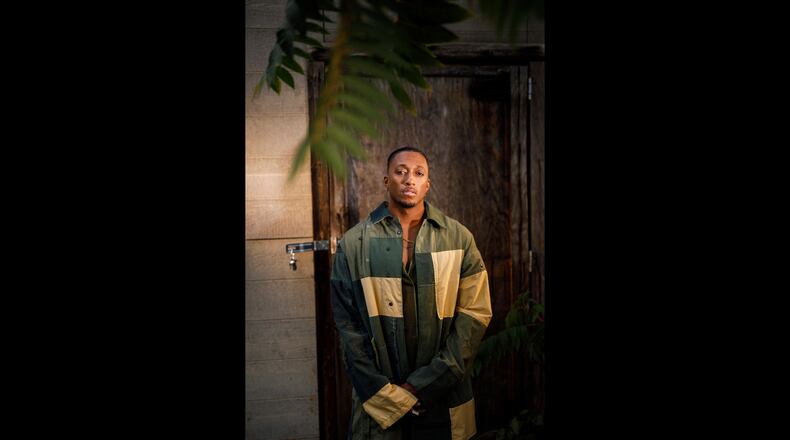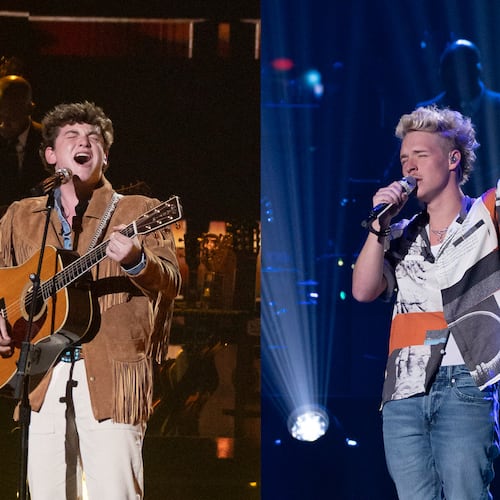For two years, Lecrae sat with a therapist, wanting to see himself more clearly and become a better husband, father, person.
He’d questioned his faith, his purpose as an artist and his success.
It was an intense period filled with depressive episodes. But now that he’s on the other side of the darkness and uncertainty, he wants to share his self-revelations.
In August, Lecrae released “Restoration,” his ninth studio album and one that delves into social justice, temptation and his continued exploration of his Christianity. Fueled by the singles “Deep End” and "Drown (featuring John Legend), the album, released on his Reach Records label, debuted at No. 1 on Billboard’s Top Christian Albums chart and landed at No. 39 on the Top R&B/Hip-Hop chart.
In keeping with the theme in his life right now, Lecrae will unveil his second book, “I Am Restored: How I Lost My Religion But Gained My Faith,” on Oct. 13, a couple of weeks after he turns 41.
“Whatever you’re dealing with in life, I want people to recognize that this is not the end. There is always the opportunity for restoration or hope,” Lecrae said. “Even if you can’t change the situation you’re in, you can be changed by the situation.”
Lecrae, a Texas native who relocated to Atlanta from Memphis in 2009, said he’s in a “phenomenal” place with his family — wife Darragh and their “pre-nagers,” whom he doesn’t showcase on social media to respect their privacy — since “gaining the tools” to navigate his issues.
Fans clamor for his open-heartedness, which has been on display in his more than 15 years of music and a slew of No. 1 albums — including “Rehab,” “Gravity” and “Anomaly" — that seamlessly mesh his faith-based rapping with lush undertones of R&B, pop and rock.
The 14 songs on “Restoration” — which also offers appearances by Kirk Franklin, BJ The Chicago Kid and YK Osiris — are arranged in a specific track order for maximum impact. The double shot of “Saturday Night” (with Jozzy) and “Sunday Morning” (with Franklin) is an especially honest unfolding of evening allures leading into the serenity of sunrise that also touches on the death of Kobe Bryant.
“(Those songs) were planned that way, but there is still a sense of recognizing that there is a demographic that won’t play them collectively,” Lecrae said. “We want (Atlanta Hawks point guard) Trae Young to be able to pass the ball, but we realize he needs to be able to score as well. So can he pass and score? That’s what I want to do. Do the songs stand alone? Yes. But how they work collectively is important to me, too.”
The song “Deep End” references Ahmaud Arbery, Michael Jackson and the Holy Ghost, working in three important components of Lecrae’s life — social justice, music and faith.
“That was a response to the emotional roller coaster I think many people are experiencing in this day and time. Seeing people killed, with Ahmaud and George (Floyd), the protests, the unrest, the political climate. It’s a lot. I think I resonated with that thought and wanted to be honest and be like, God, if you don’t carry me through this, I don’t know that I’ll make it," Lecrae said.
Always one to walk his talk, Lecrae has spent time during the coronavirus pandemic volunteering for COVID-19-centric projects with several Atlanta-based charities. He aided Love Beyond Walls in their “Love Sinks In” initiative to provide sinks in 15 locations frequented by the homeless and worked with Live Free USA’s “Masks for the People” campaign to help distribute 50,000 masks to jails and prisons in Georgia.
Credit: Alex Harper
Credit: Alex Harper
“I’m very passionate about disenfranchised communities and people who are overlooked,” Lecrae said. “People incarcerated or homeless or who live in communities that are underserved, those really grab my attention. I want to recognize the humanity of everyone.”
Terence Lester, founder of the nonprofit Love Beyond Walls, has known Lecrae for about five years and said the singer is a “whatever you need, just call me,” kind of guy. In addition to the “Love Sinks In” project — which has expanded into 45 cities in 26 states — Lecrae over the years helped the organization launch its Dignity Museum and often brought his kids to help him work with the homeless.
“He’s been out multiple times when there were no cameras or people had no idea he was coming,” Lester said. “It’s always more of a personal touch, a roll-up-your-sleeves thing…he really has a heart and wants to be consistent and build relationships. I know people are kind of shocked when he comes out to help with our projects, but he carries himself like a very genuine person.”
In “I Am Restored…,” Lecrae tackles the dichotomy of being a successful public person who is struggling internally.
“Career achievement didn’t protect Heath Ledger from the pain. Money and fame didn’t insulate Robin Williams or Anthony Bourdain. It didn’t protect Kate Spade or Don Cornelius. Many celebrities, comedians, artists, politicians, and tastemakers have fallen to an inner turmoil and darkness that they couldn’t overcome. The greatest voices have lost their will to speak. The most competent moral representatives have failed to maintain the standard they set for others. The most joyful people have drowned in a pool of despair. In the end, regardless of our popularity and professional status, we are only human,” he writes.
Never a fan of fame, Lecrae is forthright when asked if his escalating popularity around the world contributed to the strife that paralyzed him emotionally in recent years.
“Absolutely,” he said. “Humans aren’t meant to be criticized or praised as much as we do with public figures. It’s almost like taking the mask down, like the Wizard of Oz. But I understand there is no sympathy for winners. No one wants to hear LeBron (James) complain.”
About the Author
Keep Reading
The Latest
Featured






